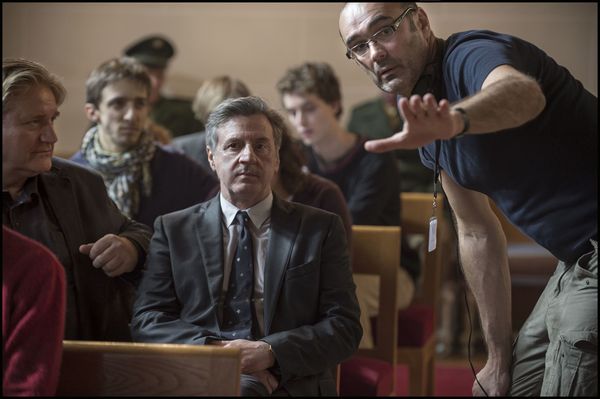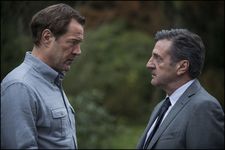 |
| On set: Vincent Garenq (right) directs Daniel Auteuil in Kalinka Photo: Unifrance |
It is based on an extraordinary real-life case involving a father’s enduring love for his daughter. Vincent Garenq’s Kalinka (known in France as Au Nom De Ma Fille) finds André Bamberski waving goodbye to his 14-year-old daughter at the airport. She is going to spend the summer of 1982 in Germany with her mother and stepfather, a seemingly caring doctor, Daniel Krombach. Bamberski never sees her alive again. When Bamberski finally receives a translation of her autopsy, it suggests she might well have been raped and murdered. What follows is a 27-year legal battle as Bamberski seeks to bring to justice Krombach, the man he’s convinced killed his daughter. Bamberski’s efforts are incredible: he fights through the courts with a stoic resolve. Richard Mowe met director Vince Garenq ahead of his visit to present the film at the Edinburgh International Film Festival on Friday 24 June, in Odeon 4.
Richard Mowe: Why do you look for inspiration in real life rather than pure dramatic invention?
Vincent Garenq: I believe that cinema should be informed and inspired by life and not by the world of cinema. I dislike scripts by scriptwriters who are inspired by the New Wave or other film-makers - that bores me. Well, I’m joking a bit. I prefer, however, to seek inspiration in real life and real people. Everyone can do what they want but that side of cinema is what I am seeking to explore. I feel at ease looking at the lives of others and that gives me the desire to write and film.
RM: How closely did you adhere to the book about the case?
VG: Kalinka was taken from an account of the case which was published as a book. At first I didn’t want to read it. I was afraid of it becoming too much like a legal report. Then finally I could resist no longer and I read it and found it totally engrossing and remarkable. I became fascinated by the subject. I had a slightly ambiguous relationship with the material - my reason told me to go one way and my heart told me to go the other. It took time to sort out this conflict, but finally I went with my heart and fell head over heels.
 |
| Confrontation: Sebastian Koch and Daniel Auteuil face to face in Kalinka Photo: Unifrance |
RM: Was the case really well known in France?
VG: Not so much. It wasn’t like my previous film The Clearstream Affair [about financial corruption]. It was much more muted. The French public were very interested in his struggle but during 27 years it did not get much press coverage. When Lamberski (played by Daniel Auteuil) kidnapped Daniel Krombach (Sebastian Koch) all of a sudden people became interested. But during all those years he was fighting a one-man battle. I know him a bit now and he was closely involved with what we were doing. He works away quietly as an accountant but he wanted to find out the truth about his daughter’s disappearance and he wanted the perpetrator to be brought to account. During all that time he never gave up.
RM: How do you collaborate with another scriptwriter and does that kind of collaboration have benefits?
VG: I like the idea of somebody else working with me - in this case Julien Rappeneau [son of Cyrano director Jean-Paul Rappeneau]. I also like to be on my own. So Julien would write a version and then I would do the same and we would meld the two. It is good to have another person to bounce back ideas. The more I do cinema the more I like the idea of asking questions and confronting issues in the script whether it be with my co-writer or my editor. It enriches the whole experience and the result.
RM: Did you approach it almost like an investigation yourself?
VG: Yes, of course. The script proceeds along those lines, like an investigation rather than giving it all away. It corresponds in some ways to the way André experienced the story himself. There is all the analysis and loose ends.
RM: How did André Bamberski react when he saw the film?
VG: I was extremely concerned about showing him the film. And because of that during the shoot I sent him the different versions of the script and a clip of the shots done that day. That way he got used to what we were doing. Despite that when I showed him the film after editing I was terrified. Finally it all went fine. What he said was simply: Good work, or something like that. At any rate he was happy with it. He is someone who could be very tough as you might deduce from the way you see him in the film. Finally he saw the finished version at a premiere in Toulouse at the time the film was released in France in March and was delighted.
RM: Did he meet up with Daniel Auteuil?
VG: There was one day he came on the set but Daniel Auteuil was a bit worried and intimidated about meeting the real person and Bamberski was concerned about meeting a famous actor. So it was curious to watch them skirt around each other. He said he was pleased with the choice of Auteuil before we started filming. He admires the actor although physically they don’t look like each other.
RM: Is Daniel Auteuil an actor who needs direction?
VG: Every actor is different but I am not a director who gives a lot of directions. I try to capture things. Daniel is very much in control of what he is doing. Occasionally I would suggest something but it was always better the way he did it in the first place. His intuition is finely tuned. And the German actor Sebastian Koch was excellent too - he very quickly found the right register for his character as did Marie-Josée Croze as the mother.
RM: An underlying theme of the film is the relationship between children and their parents - was that a point of appeal?
VG: It is about paternity and that’s what I appreciated. It seems to be a theme in all my films. The subject touches me - it wasn’t so much the case itself as the character of the father that interested me who suddenly realises he had not spent enough time with his child. If I had been in his place I am sure I would have stopped the fight long before - but he carried on. He is incredible and it was his tenacity that impressed me most.
RM: What was the main challenge with this story?
VG: I suppose the main concern was to make it cinematic without becoming too embroiled in all the bureaucracy going on around it. We spent five months in the editing room trying to make it work - but that was what was required to make it move along fluidly. And we had the changing eras over the period which also had to be authentic. In the first cut you could not sense the passage of time - it seemed like it happened only over two years so we had to address that.
RM: What’s on the horizon?
VG: I haven’t started writing yet because I take my time. But it is going to be a biopic but I don’t want to give you the name because the family don’t know all the details yet. It will be set in the world of celebrity, power, money and drugs - very rock and roll.





















